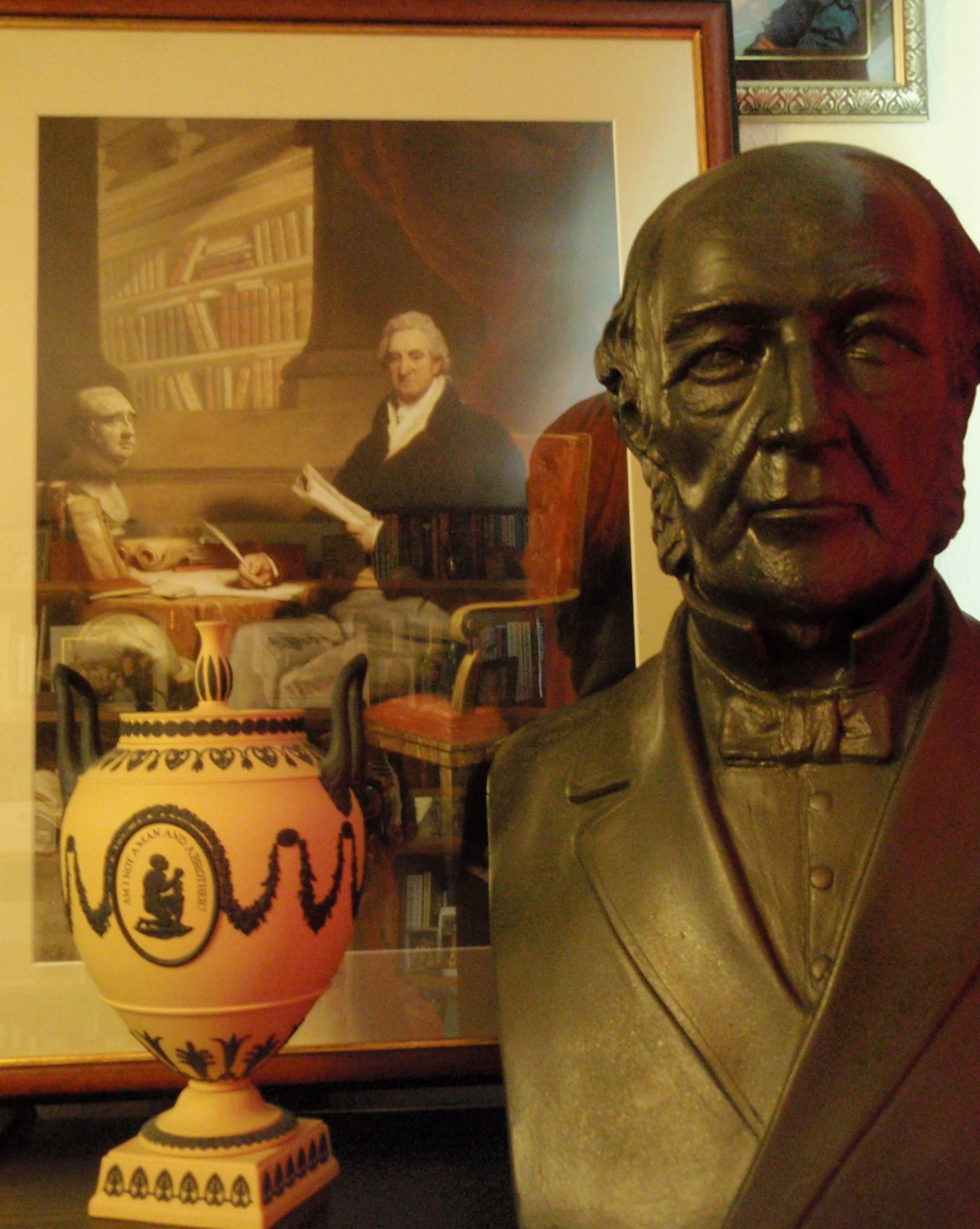Memorabilia: article for Total Politics
David Alton 
My three items of political memorabilia are linked to Liverpool.
The portrait is of William Roscoe, elected to the Commons in 1807 as a Liverpool Member – serving for just three months. During that Session William Wilberforce successfully steered through his Bill abolishing the transatlantic slave trade. Roscoe bravely opposed slavery against huge vested interests. On his return to Liverpool an angry mob assailed him and he never again returned to Parliament. Poet, philanthropist, botanist, lawyer, and educationalist, Roscoe is known as “the father of Liverpool culture.”
In 2007 –the bicentenary of the abolition of transatlantic slavery – I hosted several Roscoe Lectures to commemorate the ending of the trade. To commemorate this I was presented with the pictured urn, made by Wedgewood – Josiah Wedgewood was another noted abolitionist – and replicating the famous 1787 anti-slavery insignia: ”Am I not a man and brother?”
This was Britain’s first mass movement human rights campaign.
Roscoe’s birth and burial place is Mount Pleasant – a busy thoroughfare abutting Rodney Street, where, in 1809, William Ewart Gladstone – four times Prime Minister, champion of Ireland, architect of free elementary education and the secret ballot – was born.
His family’s wealth was derived from the slave trade – owning significant sugar plantations in the Caribbean. In 1833, as a young MP, Gladstone opposed the Abolition of Slavery Act – enacted as Wilberforce lay dying. On visiting the Statesman’s death bed, Gladstone prayed with him and now, animated by a deep Anglo-Catholic faith, vowed to renounce his previous support for slavery.
Serendipitously, in 1998, the anniversary year of Gladstone’s death, a friend telephoned to say that a broken terracotta bust of the Grand Old Man had been rescued from a demolition site. The chest was caved in and the head encrusted with guano. Was I interested in buying it? Mr.Gladstone departed in my car boot. A few hours later it was in the gifted hands of my friend, Stephen Broadbent, the Liverpool sculptor.
Beautifully restored, Mr.Gladstone took pride of place in my university office – appropriately enough, in Liverpool’s Rodney Street.
It was later used to create a replica and presented to Liverpool’s blind community historian, Steve Binns: a Gladstone aficionado.
Today, Mr.Gladstone dominates my study, along with something which he once said: “We look forward to the time when the power of love will replace the love of power, then will our world know the blessings of peace.” His last great speech – defending the Armenians against the atrocities of the Ottoman Turks – was delivered in Liverpool, in 1896, to 7,000 people at Hengler’s Circus, in today’s inner city where, as a student, I would one day become the local councillor and later an MP.
Lord Alton of Liverpool has been an Independent Crossbench Peer since 1997, having served for 18 years as a Liverpool Member of Parliament. He is a former Liberal Chief Whip. He is Director of the Roscoe Foundation for Citizenship and is Professor of Citizenship at Liverpool John Moores University.
His illustrated Lecture “Son of Liverpool, Scourge of Tyrants”, celebrating the bicentenary of Gladstone’s birth may be viewed at http://www.davidalton.com/2009/11/Gladstone%20-%20son%20of%20Liverpool,%20scourge%20of%20tyrants.html
And his lecture on William Roscoe “Father of Liverpool Culture” can be viewed at:
https://www.davidalton.net/2010/12/23/the-life-of-william-roscoe-father-of-liverpool-culture/
The three items in the picture are the restored bust of William Ewart Gladstone, a portrait of William Roscoe and a piece of Wedgewood pottery commemorating the abolition of the transatlantic slave trade.
Memorabilia…article for "Total Politics"

For 18 years David Alton was a Member of the House of Commons and today he is an Independent Crossbench Life Peer in the UK House of Lords.
Social Media
Site Search
Recent Posts
£1 Trillion – Raised In Parliament Today. The Cost of Reparations In Ukraine and Bringing To Justice Those Responsible.
https://youtu.be/xlEfrgwELvc Alongside the...
Stop Perpetrators Getting Away With Genocide – Public Letter sent to the UK Prime Minister and Foreign Secretary on the Genocide Determination Bill 2023-24. The letter was published this morning, 17 April 2024, 06:00 am UK time.
Stop Perpetrators Getting Away With Genocide -...
